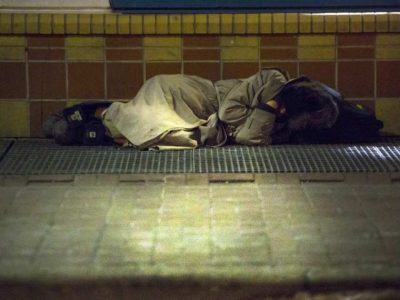Where in Canada is it hardest to be very poor?

Calgary’s housing climate for low-income earners is a “disaster,” says the author of a new report looking at housing affordability across Canada.
The University of Calgary’s School of Public Policy released the report Wednesday that examined data from Canada’s nine largest cities over 24 years (1990 to 2014), and found Calgary is the worst place to live for those living in poverty.
“Calgary is a disaster. It’s disaster for singles, it’s a disaster for single parents, it’s a disaster for couples with kids living on low incomes,” said the report’s lead author, Ron Kneebone.
“Calgary is the most expensive city in Canada for a poor person to live.”
As the federal Liberal government works to craft a national housing strategy by the end of fall ahead of next year’s budget, the report, Kneebone said, should serve as a signpost to where the greatest need is, and focus on those at the margins who are most likely to face homelessness.
According to the study, a single parent with one child in the lowest 20 per cent of income earners, living in a single-bedroom suite in Calgary, would spend nearly 80 per cent of the money they derive from social assistance on rent, leaving little financial wiggle room at the end of the month for other essentials.
Meanwhile, in Quebec City, the same demographic would spend just over 35 per cent of their income on housing. Kneebone said Montreal and Quebec City have consistently been the best places to live for low-income earners.
Kneebone said there are many factors that helped create that disparity, but the primary one is the fact that over 24 years, rental prices in Calgary have increased an average of 3.4 per cent annually, compared with an annual 1.6 per cent rise in social assistance funding. Conversely, the average rent in Montreal rose an average of two per cent with social assistance climbing 2.6 per cent.
Kevin McNichol, vice-president of strategy with the Calgary Homeless Foundation, said there’s not a simple answer to the problem, but not investing in affordable housing and social assistance can lead to much higher costs to taxpayers, estimated to be about three times more.
“We have a deficit of housing at the low end of the scale, and there are those on social assistance who aren’t even able to enter the market,” he said.
“When we remove people from the street, we reduce that social burden on everybody else.”
Calgary Coun. Brian Pincott said the sobering numbers come as no surprise, but it should serve as a rallying cry for policy-makers to create a system that helps people avoid falling through the cracks.
“We need to sit down with all three orders of government and get serious about this,” he said.
“We’ve talked long enough. We require money and a concerted effort to fix this. Maybe now is the time to start talking about solutions like guaranteed annual incomes.”
Kneebone said there’s no silver bullet to the problem, but increasing income for Canada’s poorest citizens would be a good start. Well-thought-out rent controls and socialized housing should also be on the discussion table.
“All levels of government need to be contributing to a solution,” he said.
“There’s a lot of things public policy-makers can do to help the problem, because if people can’t afford a place to live, they’re going to end up in a homeless shelter.”
On Twitter: @ShawnLogan
Source: Calgary Herald


